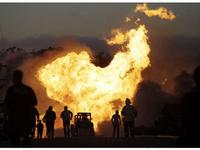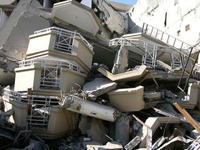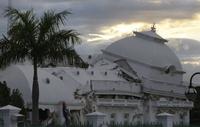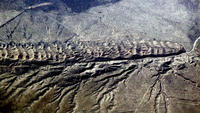-
Building codes increasingly unable to withstand extreme weather
Basic infrastructure around the world has had increasing difficulty in withstanding more extreme weather patterns; with record snow falls in the Northeastern United States, hundreds of roofs have collapsed under the weight of snow and in 2008 heavy snows in China caused 223,000 homes to collapse resulting in $1 billion in insured damages; engineers and insurers worry that current building designs may not be able to withstand more extreme weather patterns; engineers have built more robust safety mechanisms into their designs, but municipal building codes that determine the minimum standard have lagged behind; insurance companies have changed their policies to offer lower premiums to homes that are better built and have refused to insure homes in high-risk areas
-
-
Aging U.S. natural gas pipelines are ticking time bombs

Fourteen people are dead, dozens injured and entire neighborhoods are gone in the wake of three massive gas pipeline explosions in San Bruno, California; Philadelphia and Allentown, Pennsylvania, over the past six months; more than 2,800 significant gas pipeline accidents have been recorded across the United States since 1990 — a third of them causing deaths and significant injuries; there are more than 210 natural gas pipeline systems, made of cast iron, steel, and plastic with more than 21,000 miles running through heavily populated areas
-
-
China plans to build alternative to Panama Canal
China recently struck a deal with Colombia to build a railway system that would connect the Atlantic to the Pacific oceans; China hopes this link will create a viable alternative to the Panama Canal; the railway would help ease China’s growing demand for raw materials, particularly coal, and act as an additional outlet for Chinese exports; Colombia is the fifth largest coal producer in the world, but most of its coal is exported through its ports on the Atlantic side; trade between China and Colombia has skyrocketed from $10 million in 1980 to $5 billion in 2010
-
-
Contradictions in U.S. cybersecurity policy
The United States wants a secure cyberspace, but its intelligence agencies have found enormous utility in using their own computer hacking capabilities to collect confidential information from foreign adversaries; this raises the question of how the U.S. government can push for global cybersecurity while at the same time using cyber means to collect intelligence on potentially threatening regimes such as Iran
-
-
Ancient catastrophic drought a warning about current warming trends
Extreme megadrought in Afro-Asian region likely had consequences for Paleolithic cultures; the records show that one of the most widespread and intense droughts of the last 50,000 years or more struck Africa and Southern Asia 17,000 to 16,000 years ago; the “H1 megadrought” was one of the most severe climate trials ever faced by anatomically modern humans; Africa’s Lake Victoria, now the world’s largest tropical lake, dried out, as did Lake Tana in Ethiopia, and Lake Van in Turkey; the Nile, Congo, and other major rivers shriveled
-
-
Insider threat problem topic of a GovSec panel
A recent batch of leaked cables from the State Department reveals concerted efforts by terrorist organizations to obtain WMDs and the danger that “insider threats” pose at facilities that house radioactive materials; in September 2009 two employees at the Rossing Uranium Mine in Namibia smuggled nearly half a ton of yellowcake out of the facility; the pair was eventually caught, but 550 pounds were not intercepted and have gone missing; another cable expressed fears that an employee working in one of Pakistan’s nuclear facilities could “gradually smuggle enough material out to eventually make a weapon”; these incidents are but two examples of the growing danger insiders, motivated by money or ideology, pose
-
-
NZ earthquake illustrates risks for U.S. west coast

The recent 6.3 magnitude earthquake in Christchurch, New Zealand, killed many more people and caused far more damage than the September 2010 7.1 magnitude earthquake which struck the same area; the reason: even though this earthquake was weaker than last year’s event, it was much shallower; was situated directly under Christchurch; hit during the lunch hour when more people were exposed to damage; and shook sediments that were prone to “liquefaction,” which can magnify the damage done by the ground shaking; scientists say the same description nicely fits many major cities and towns in Washington, Oregon, California, and British Columbia
-
-
Danger building up behind aging, vulnerable dams
Of the U.S. 85,000 dams, more than 4,400 are considered susceptible to failure; a 2009 report put the cost of fixing the most critical dams — where failure could cause loss of life — at $16 billion over twelve years, with the total cost of rehabilitating all dams at $51 billion; those figures do not include dams among the approximately 3,000 that are owned by the federal government; the Army Corps of Engineers, for example, says that more than 300 of the roughly 700 dams it is responsible for need safety-related repairs, and estimates the total fix-up bill at about $20 billion
-
-
Satellite system to provide earlier earthquake warnings
British and Russian scientists are planning a satellite system that will monitor seismic activity from space in the hope of one day predicting the occurrence of earthquakes and volcanic eruptions.
The TwinSat project will put one micro-sized and one nano-sized satellite into low earth orbit some 400 kilometers apart, which will work in unison to collect and interpret electromagnetic signatures from the ground -
-
Haiti's quake damage yields better building codes

In the aftermath of the 7.0 magnitude earthquake that shook Haiti last year and killed more than 300,000 people, University of Arizona researchers descended upon the country’s capital to study buildings that survived the quake; researchers documented damaged buildings to develop a sophisticated three dimensional model; they are working to develop stricter building codes to ensure that buildings can withstand earthquakes in the future; their focus is on designing low-cost easy to implement localized solutions; buildings that were not built to withstand earthquakes were the primary cause of death in the disaster
-
-
Industry wants current safety law extended rather than see it toughened
Before the House Homeland Security committee, Timothy J. Scott, the chief security officer of Dow Chemical Co., urged Congress permanently to reauthorize the Chemical Facility Anti-Terrorism Standards (CFATS) bill; under CFATS chemical facilities are required to address a range of critical security concerns including protecting facilities against attacks and preventing the theft of dangerous chemicals; currently, more than 35,000 facilities that use or store chemicals are required to meet CFATS regulations; DHS has worked with facility owners to mitigate risks with custom developed security plans at more than 2,000 “high risk” sites
-
-
Rising seas will affect major U.S. coastal cities by 2100
The Gulf and southern Atlantic coasts will be particularly hard hit by rising sea levels, research predicts. Miami, New Orleans, Tampa, Florida, and Virginia Beach, Virginia could lose more than 10 percent of their land area by 2100
-
-
Boston has new pot-hole weapons
In a typical year, the city of Boston fills about 19,000 potholes; the city now has two new pot-hole weapons in its arsenal: a $151,300 Pro-Patch Pothole Patcher truck, and a new iPhone and Android app, called Street Bump, which would automatically report potholes to the city by sensing when a car has hit a bump (the app has not been released yet, but test-drives are already being conducted)
-
-
Be prepared: earthquakes big and small

The February issue of the Bulletin of the Seismological Society of America offers insights into small seismic problems — and big ones — the United States faces; there were a series of small tremors in the Dallas-Forth Worth area — home to more than four million residents that has experienced no previous earthquakes in historic time; the Coachella Valley section of the San Andreas fault, between San Gorgonio Pass and the Imperial Valley, is the only portion of the fault which has not ruptured in a major earthquake during historical time; this is not good news: This long period of quiescence suggests that an unusually large amount of elastic strain has built up along the southern San Andreas segment, making it likely to produce a large to great (Mw7-8) earthquake in the near future
-
-
Hoover Dam is safe from hackers
In response to the debate over the controversial Senate Internet “kill switch” bill, the U.S. Bureau of Reclamation refuted a central argument that the law’s proponents have been using; proponents of the bill have often stated the need for the bill because terrorists could hack into the system and open the Hoover Dam’s floodgates; the dam is not connected to the Internet and has several physical and technological safeguards that prevent the floodgates from opening; the proposed bill would authorize the president to sever critical infrastructure from the Internet in the event of a cyber attack; critics say the bill could violate First Amendment rights
-
- All
- Regional
- Water
- Biometrics
- Borders/Immig
- Business
- Cybersecurity
- Detection
- Disasters
- Government
- Infrastructure
- International
- Public health
- Public Safety
- Communication interoperabillity
- Emergency services
- Emergency medical services
- Fire
- First response
- IEDs
- Law Enforcement
- Law Enforcement Technology
- Military technology
- Nonlethal weapons
- Nuclear weapons
- Personal protection equipment
- Police
- Notification /alert systems
- Situational awareness
- Weapons systems
- Sci-Tech
- Sector Reports
- Surveillance
- Transportation
Advertising & Marketing: advertise@newswirepubs.com
Editorial: editor@newswirepubs.com
General: info@newswirepubs.com
2010-2011 © News Wire Publications, LLC News Wire Publications, LLC
220 Old Country Road | Suite 200 | Mineola | New York | 11501
Permissions and Policies
Editorial: editor@newswirepubs.com
General: info@newswirepubs.com
2010-2011 © News Wire Publications, LLC News Wire Publications, LLC
220 Old Country Road | Suite 200 | Mineola | New York | 11501
Permissions and Policies
